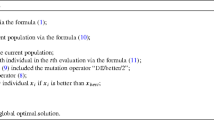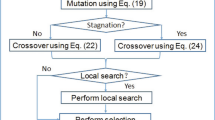Abstract
Since the introduction of differential evolution (DE) algorithms, they have achieved remarkable success in the field of evolutionary algorithms and engineering applications. In single-objective DE algorithms, most researchers tend to focus on improving mutation operators and parameter control, while overlooking the study of selection operators. However, the study of selection operators still holds great potential in enhancing the performance of DE algorithms. This study proposes a fitness-distance-based selection (FDS) strategy and a new scaling factor control method. FDS is divided into two stages. The first stage is to determine whether an individual needs to accept discarded trial vectors. The second stage involves selectively accepting these discarded trial vectors, which is based on the information related to the discarded trial vectors and the corresponding target vector. A new setting for the scaling factor parameter is proposed, designed to more effectively assist FDS in enhancing algorithm performance. Based on these strategies, an improved variant of the DE algorithm, called fitness-distance-based DE (FDDE) algorithm, is further proposed by this study. To verify the performance of FDDE, we conducted an in-depth study comparing it with six other advanced DE variants and four famous evolutionary algorithms using the CEC 2017, CEC 2022, and CEC 2011 benchmark sets. The experimental results demonstrate that the FDS strategy and the new scaling factor can significantly improve the performance of DE algorithms, and FDDE is significantly better than other advanced algorithm.











Similar content being viewed by others
Explore related subjects
Discover the latest articles and news from researchers in related subjects, suggested using machine learning.Data availability
The data used to support the findings of this study are available from the corresponding author upon request.
References
Storn R, Price K (1997) Differential evolution-a simple and efficient heuristic for global optimization over continuous spaces. J Global Optim 11:341–359
Rauf HT, Bangyal WHK, Lali MI (2021) An adaptive hybrid differential evolution algorithm for continuous optimization and classification problems. Neural Comput Appl 33(17):10841–10867
Hameed A, Aboobaider B, Mutar M et al (2020) A new hybrid approach based on discrete differential evolution algorithm to enhancement solutions of quadratic assignment problem. Int J Ind Eng Comput 11(1):51–72
Li W, Wu B (2019) A modified differential evolution algorithm for constrained optimization problems. In: 2019 2nd World Conference on Mechanical Engineering and Intelligent Manufacturing (WCMEIM). IEEE, pp 69–72
Sallam KM, Elsayed SM, Chakrabortty RK, et al (2020) Improved multi-operator differential evolution algorithm for solving unconstrained problems. In: 2020 IEEE Congress on Evolutionary Computation (CEC). IEEE, pp 1–8
Zhao F, Zhao L, Wang L et al (2020) An ensemble discrete differential evolution for the distributed blocking flowshop scheduling with minimizing makespan criterion. Expert Syst Appl 160:113678
Houssein EH, Rezk H, Fathy A et al (2022) A modified adaptive guided differential evolution algorithm applied to engineering applications. Eng Appl Artif Intell 113:104920
Wang R, Fan F, Shen F et al (2021) Application of differential evolution on elasticity measurement of low quality factor materials using fem-based resonant ultrasound spectroscopy. J Mech Behav Biomed Mater 124:104848
Kuang B, Xiao C, Wang Z (2021) An enhanced differential evolution for solving extended environmental/economic dispatch. In: 2021 IEEE 5th Information Technology, Networking, Electronic and Automation Control Conference (ITNEC). IEEE, pp 1061–1066
Mezura-Montes E, Velázquez-Reyes J, Coello Coello CA (2006) A comparative study of differential evolution variants for global optimization. In: Proceedings of the 8th Annual Conference on Genetic and Evolutionary Computation, pp 485–492
Liu G, Xiong C, Guo Z (2015) Enhanced differential evolution using random-based sampling and neighborhood mutation. Soft Comput 19:2173–2192
Xia X, Tong L, Zhang Y et al (2021) Nfdde: a novelty-hybrid-fitness driving differential evolution algorithm. Inf Sci 579:33–54
Meng Z, Yang C (2022) Two-stage differential evolution with novel parameter control. Inf Sci 596:321–342
Price K, Storn RM, Lampinen JA (2006) Differential evolution: a practical approach to global optimization. Springer
Zhang J, Sanderson AC (2009) Jade: adaptive differential evolution with optional external archive. IEEE Trans Evol Comput 13(5):945–958
Basetti V, Chandel AK, Subramanyam K (2018) Power system static state estimation using jade-adaptive differential evolution technique. Soft Comput 22:7157–7176
Li G, Lin Q, Cui L et al (2016) A novel hybrid differential evolution algorithm with modified code and jade. Appl Soft Comput 47:577–599
Deng W, Shang S, Cai X et al (2021) Quantum differential evolution with cooperative coevolution framework and hybrid mutation strategy for large scale optimization. Knowl-Based Syst 224:107080
Wang Y, Cai Z, Zhang Q (2011) Differential evolution with composite trial vector generation strategies and control parameters. IEEE Trans Evol Comput 15(1):55–66
Qian W, Chai J, Xu Z et al (2018) Differential evolution algorithm with multiple mutation strategies based on roulette wheel selection. Appl Intell 48:3612–3629
Pant M, Ali M, Abraham A (2009) Mixed mutation strategy embedded differential evolution. In: 2009 IEEE Congress on Evolutionary Computation. IEEE, pp 1240–1246
Maučec MS, Brest J, Bošković B et al (2018) Improved differential evolution for large-scale black-box optimization. IEEE Access 6:29516–29531
Yang Q, Yan JQ, Gao XD et al (2022) Random neighbor elite guided differential evolution for global numerical optimization. Inf Sci 607:1408–1438
Tan Z, Tang Y, Li K et al (2022) Differential evolution with hybrid parameters and mutation strategies based on reinforcement learning. Swarm Evol Comput 75:101194
Zhang Y, Dai G, Peng L et al (2023) Enhancing differential evolution algorithm through a population size adaptation strategy. Nat Comput 22(2):379–392
Deng L, Li C, Han R et al (2021) Tpde: a tri-population differential evolution based on zonal-constraint stepped division mechanism and multiple adaptive guided mutation strategies. Inf Sci 575:22–40
Poláková R, Tvrdík J, Bujok P (2019) Differential evolution with adaptive mechanism of population size according to current population diversity. Swarm Evol Comput 50:100519
Li K, Fu X, Wang F et al (2022) A dynamic population reduction differential evolution algorithm combining linear and nonlinear strategy piecewise functions. Concurr Comput Pract Exp 34(6):e6773
Zhang X, Zhan ZH, Zhang J (2020) Adaptive population differential evolution with dual control strategy for large-scale global optimization problems. In: 2020 IEEE Congress on Evolutionary Computation (CEC). IEEE, pp 1–7
Zeng Z, Zhang M, Chen T et al (2021) A new selection operator for differential evolution algorithm. Knowl-Based Syst 226:107150
Zeng Z, Hong Z, Zhang H et al (2022) Improving differential evolution using a best discarded vector selection strategy. Inf Sci 609:353–375
Das S, Konar A, Chakraborty UK (2005) Improved differential evolution algorithms for handling noisy optimization problems. In: 2005 IEEE Congress on Evolutionary Computation. IEEE, pp 1691–1698
Yu X, Liu Z, Wu X et al (2021) A hybrid differential evolution and simulated annealing algorithm for global optimization. J Intell Fuzzy Syst 41(1):1375–1391
Abbas Q, Ahmad J, Jabeen H, et al (2015) A novel tournament selection based differential evolution variant for continuous optimization problems. Math Probl Eng 2015
Ghosh A, Das S, Mallipeddi R et al (2017) A modified differential evolution with distance-based selection for continuous optimization in presence of noise. IEEE Access 5:26944–26964
Zeng Z, Zhang H (2022) An evolutionary-state-based selection strategy for enhancing differential evolution algorithm. Inf Sci 617:373–394
Awad N, Ali M, Liang J, et al (2016) Problem definitions and evaluation criteria for the cec 2017 special session and competition on single objective bound constrained real-parameter numerical optimization. In: Technical Report. Nanyang Technological University Singapore, pp 1–34
Biedrzycki R, Arabas J, Warchulski E (2022) A version of nl-shade-rsp algorithm with midpoint for cec 2022 single objective bound constrained problems. In: 2022 IEEE Congress on Evolutionary Computation (CEC). IEEE, pp 1–8
Das S, Suganthan PN (2010) Problem definitions and evaluation criteria for cec 2011 competition on testing evolutionary algorithms on real world optimization problems. Jadavpur Univ Nanyang Technol Univ Kolkata 1:341–359
Viktorin A, Senkerik R, Pluhacek M et al (2019) Distance based parameter adaptation for success-history based differential evolution. Swarm Evol Comput 50:100462
Aggarwal S, Mishra KK (2023) X-mode: extended multi-operator differential evolution algorithm. Math Comput Simul 211:85–108
Zhu L, Ma Y, Bai Y (2020) A self-adaptive multi-population differential evolution algorithm. Nat Comput 19:211–235
Brest J, Zamuda A, Fister I, et al (2010) Large scale global optimization using self-adaptive differential evolution algorithm. In: IEEE Congress on Evolutionary Computation. IEEE, pp 1–8
Qin AK, Huang VL, Suganthan PN (2008) Differential evolution algorithm with strategy adaptation for global numerical optimization. IEEE Trans Evol Comput 13(2):398–417
Meng Z, Song Z, Shao X et al (2023) Fd-de: differential evolution with fitness deviation based adaptation in parameter control. ISA Trans 139:272–290
Tanabe R, Fukunaga AS (2014) Improving the search performance of shade using linear population size reduction. In: 2014 IEEE Congress on Evolutionary Computation (CEC). IEEE, pp 1658–1665
Tanabe R, Fukunaga A (2013) Success-history based parameter adaptation for differential evolution. In: 2013 IEEE Congress on Evolutionary Computation. IEEE, pp 71–78
Zhang X, Liu Q, Qu Y (2023) An adaptive differential evolution algorithm with population size reduction strategy for unconstrained optimization problem. Appl Soft Comput 138:110209
Zeng Z, Zhang M, Zhang H et al (2022) Improved differential evolution algorithm based on the sawtooth-linear population size adaptive method. Inf Sci 608:1045–1071
Brest J, Maučec MS, Bošković B (2016) il-shade: Improved l-shade algorithm for single objective real-parameter optimization. In: 2016 IEEE Congress on Evolutionary Computation (CEC). IEEE, pp 1188–1195
Brest J, Maučec MS, Bošković B (2017) Single objective real-parameter optimization: Algorithm jso. In: 2017 IEEE Congress on Evolutionary Computation (CEC). IEEE, pp 1311–1318
Cui L, Huang Q, Li G et al (2018) Differential evolution algorithm with tracking mechanism and backtracking mechanism. IEEE Access 6:44252–44267
Guo SM, Yang CC, Hsu PH et al (2014) Improving differential evolution with a successful-parent-selecting framework. IEEE Trans Evol Comput 19(5):717–730
Xu C, Huang H, Ye S (2014) A differential evolution with replacement strategy for real-parameter numerical optimization. In: 2014 IEEE Congress on Evolutionary Computation (CEC). IEEE, pp 1617–1624
Meng Z, Yang C (2021) Hip-de: historical population based mutation strategy in differential evolution with parameter adaptive mechanism. Inf Sci 562:44–77
Meng Z, Zhong Y, Mao G et al (2022) Pso-sono: a novel pso variant for single-objective numerical optimization. Inf Sci 586:176–191
Gao Y, Zhang J, Wang Y, et al (2024) Love evolution algorithm: a stimulus–value–role theory-inspired evolutionary algorithm for global optimization. J Supercomput:1–62
Ghasemi M, Zare M, Zahedi A et al (2024) Optimization based on performance of lungs in body: lungs performance-based optimization (lpo). Comput Methods Appl Mech Eng 419:116582
Mirjalili S, Lewis A (2016) The whale optimization algorithm. Adv Eng Softw 95:51–67
Funding
This work was supported by the National Natural Science Foundation of China (62076110) and the Natural Science Foundation of Jiangsu Province (BK20181341).
Author information
Authors and Affiliations
Contributions
Yawei Huang was responsible for methodology and writing—original draft preparation. Yawei Huang, Xuezhong Qian, and Wei Song performed validation. Yawei Huang and Xuezhong Qian contributed to writing—reviewing and editing. Xuezhong Qian and Wei Song were involved in project administration.
Corresponding author
Ethics declarations
Conflict of interest
The authors declare that they have no known competing financial interests or personal relationships that could have appeared to influence the work reported in this paper.
Ethical and informed consent for data used
All data used in this study are derived from publicly available databases. These data are public and do not involve the use of or conflict of interest of personal privacy; therefore, no specific ethical review and informed consent are required. We have adhered to all appropriate provisions and requirements for using these data.
Additional information
Publisher's Note
Springer Nature remains neutral with regard to jurisdictional claims in published maps and institutional affiliations.
Rights and permissions
Springer Nature or its licensor (e.g. a society or other partner) holds exclusive rights to this article under a publishing agreement with the author(s) or other rightsholder(s); author self-archiving of the accepted manuscript version of this article is solely governed by the terms of such publishing agreement and applicable law.
About this article
Cite this article
Huang, Y., Qian, X. & Song, W. Enhancing differential evolution algorithm with a fitness-distance-based selection strategy. J Supercomput 80, 22245–22286 (2024). https://doi.org/10.1007/s11227-024-06298-0
Accepted:
Published:
Issue Date:
DOI: https://doi.org/10.1007/s11227-024-06298-0




